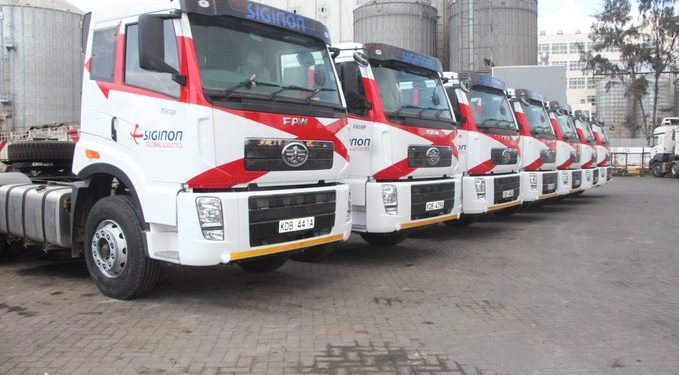The Siginon Group has acquired 10 new trucks to meet an increasing demand as the regional economies gain footing after close to a year with COVID 19 pandemic crisis that sent a shockwave across the globe as players sought measures to tackle it.
Announcing the new acquisition, Siginon Group said that there is widespread knowledge now about the pandemic, which has seen various vaccines being developed in a record time in a move that has brought confidence in the supply chain as players learn ‘new normal’ in doing things.
When COVID 19 reached the East African region for the first time early last year, there was very little information on how to contain it leading to strict containment measures that curtailed cargo movement and cross border trade leaving business bleeding heavily.
Meshack Kipturgo, Siginon Group managing director said that the economies are now bouncing back to normalcy following new containment measures that has now eased border crossing and cargo movement.
Siginon has already subscribed to the Standard Operating Procedures (SOP) adopted last year, which have been guiding the industry in containing COVID 19 as the logistics industry sought to spring back in a ‘new normal’ environment.
The SOPs were developed by a consultant and a team of industry experts in cargo transport, Warehousing, Freight Forwarding and Customs clearance.
The company will also acquire another fleet of 30 more new trucks this month to satisfactorily meet its customer’s demand, according to Kipturgo.
The Group is an integrated end to end logistics and air cargo solutions provider based in Kenya, Tanzania and Uganda with over 35 years’ experience. The firm provides supply chain solutions to its customers from the source to the final destination. It is located in Nairobi, Mombasa and Eldoret in Kenya, Dar es Salaam in Tanzania and in Kampala, Uganda.
The company provides customs clearance, freight forwarding, warehousing, Ground Handling, transportation, port services and air cargo handling in East Africa.
“At Siginon, we ably serve regional and international markets focusing on satisfying needs in East Africa and the Great Lakes region. Some of our key markets include Kenya, Uganda, Tanzania, Rwanda, Burundi, Somali, Northern DR Congo and Southern Sudan,” Kipturgo said.
Signs of economic recovery have been evidenced in the last two months at the port of Mombasa and Southern region, which collected Sh 200.95 billion surpassing a target of Sh 183.578 billion in the half financial year ending in December 2020.
In December 2020, the Customs & Border Control (C&BC) Department recorded the highest ever monthly revenue collection in KRA’s history by collecting Kshs 60.777 billion reflecting a growth of 40.9% and registering a revenue surplus of Kshs 12.191 billion.
“This resulted in a cumulative surplus for Customs revenue of Kshs 3.788 billion at the end of December 2020 compared to a deficit of Kshs 8.402 billion as at the end of November 2020,” Mr Githii Mburu, Commissioner General of KRA said in a recent statement.
The prime movers that the Siginon is acquiring will be able to carry out both the containerized and conventional cargo due to their adaptability, according to Kipturgo.
Fast-growing sectors such as financial services, manufacturing, retail, transport and ICT have provided launch pads for those itching to venture regionally and outside their comfort zones.
“The spirit of the Common Market Protocol encouraged Kenyan companies to venture into the region but most realised the situation on the ground was quite different. Despite the challenges, Kenyan companies have benefited specifically when it comes to free movement of persons, labour and capital,” said Kipturgo.
EAC countries have to a large extent domesticated the Common Market Protocol making it easier for private companies to establish cross-border operations, but some have gone against the agreement on areas like free movement of people and land use that remains restricted.
Efforts to harmonise taxes, creation of one-stop border points, common investments in infrastructure projects and other initiatives have turned the EAC into a fertile expansion territory.
Investment in the IT system will play a crucial role in the future of the supply chain. Siginon rode on the systems it has created to circumvent COVID 19 challenges.
The company offers its customers modern, spacious and secure warehousing that meet their unique needs. The facilities include storage of cargo in cold rooms as well as in general, transit and bonded warehouses.
In Mombasa, warehouses’ capacity are 136,000 square feet, Nairobi are 90,500 square feet and Eldoret 7,400 square feet. The company has a further 40,000 square feet of open space available adjacent to the Siginon Nairobi and Mombasa complex.
The warehousing include export, import and domestic distribution centers with inventory management and control, bar-coding, re-packaging, labeling, quality inspection, kitting and other value-added services.





